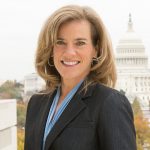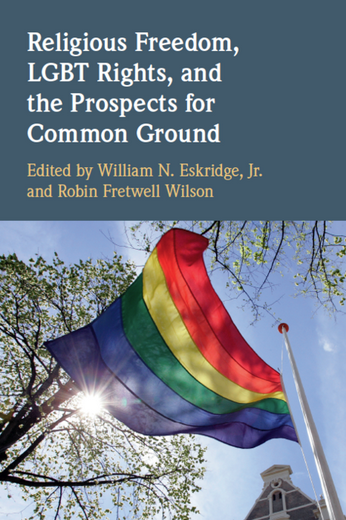
 By Holly Hollman, BJC General Counsel
By Holly Hollman, BJC General Counsel
Does the U.S. Constitution require religious exemptions to certain LGBT rights? Can state laws protect the full and equal enjoyment of public facilities by LGBT people despite religious objections of some store owners? The U.S. Supreme Court has not answered those questions squarely. In the Masterpiece Cakeshop case decided in June, the Court sided with a baker who refused to prepare a wedding cake for a same-sex couple because it found the bakery had not received a fair (religiously neutral) hearing. The Court neither resolved the broader conflict that has arisen between religious objections and state anti-discrimination laws nor offered guidance for the many related legal conflicts facing civil rights and religious liberty.
While the challenges will continue for the foreseeable future, a much-needed, thoughtful resource is now available. Religious Freedom, LGBT Rights, and the Prospects for Common Ground is a collection of essays that brings together leading voices from different perspectives, including the BJC’s, to take on some of the most difficult issues between LGBT rights and some faith communities. As described in the introduction, the essays are intended to offer a “360-degree view of culture war conflicts around faith and sexuality.” The book explores “whether communities with such profound differences in belief are able to reach mutually acceptable solutions in order to live with integrity.”
The book’s editors, William N. Eskridge Jr. and Robin Fretwell Wilson, convened an open dialogue and search for common ground by engaging an impressive group of ecclesiastical leaders, LGBT rights advocates, seminary presidents, theologians, and equality and religious liberty scholars and activists. Their discourse and feedback led to the essays, which examine the possibilities and perceived limits of reconciling differences.
The book is organized to help frame civil dialogue and find guiding principles to mediate conflicts, as well as explore specific perspectives from faith traditions and civil rights law. It also addresses the significant practical challenges that arise in the context of higher education and public accommodations laws.
The variety of conflicts that arise is vast. The difficulty of even discussing many of them has taken a toll. But accommodating religious differences is not a new challenge under our constitutional order, which is why I focus my chapter on putting the conflicts in a broader perspective. Drawing on our first principles that protect religious liberty for all, “Why Money Matters: LGBT Rights and Religious Freedom” reviews the historical and practical ways we live with our religious differences. The United States’ legal tradition of protecting religious liberty seldom operates in absolute terms; religious liberty is not protected the same way in every context. When religious institutions accept government money, for example, they undercut their broad claims for religious autonomy.
The book’s editors note that “[r]eaders almost certainly will disagree with something in the volume. But whatever policy prescription Americans ultimately embrace, it is essential to develop a public understanding of what is at stake.” Indeed, the BJC is deeply grateful for the way this effort reveals the complexity of the issues and the tremendous good will needed to build bridges and find a positive way forward in our policy debates.
“As the list of contributors makes clear, this volume represents an honest attempt to give parity of treatment between communities and ideas without prejudging the outcome. Our contributors are especially suited to open this dialogue. All have written extensively about LGBT rights, same-sex marriage, or religious liberty. Many have long had a foot in the policy and legislative worlds and so bring a healthy respect for how difficult that task may be. All approach the subject with good will and a recognition that these are hard issues that go to who we are as individuals and as a people. To enhance the cohesion of the book, the editors have added references throughout the chapters to other chapters. As you read the volume, we hope you will share our optimism that people of good will can forge new ways to reconcile the needs of the faith and LGBT communities.” – William N. Eskridge Jr. and Robin Fretwell Wilson, editors
The book will be available from Cambridge University Press by 2019. View the table of contents and purchase the book online at bit.ly/CommonGround2019 and use the code WNESKRIDGE2018 for a 20% discount.
This article originally appeared in the November/December 2018 issue of Report from the Capital. To view the PDF online, click here.





